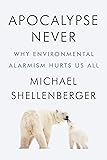
Apocalypse Never

Were the antinuclear activists themselves really so afraid of nuclear? There are reasons to doubt it. A Sierra Club member who led the campaign to kill Diablo Canyon confessed, “I really didn’t care [about nuclear plant safety] because there are too many people in the world anyway. . . . I think that playing dirty, if you have a noble end, is
... See moreMichael Shellenberger • Apocalypse Never
Humankind could only redeem itself from the scourge of nuclear weapons by realizing the dream of universal prosperity—and that required cheap and abundant energy.
Michael Shellenberger • Apocalypse Never
We must change our thinking, too. Just as we overcame our preference for authentic furs, ivory, and tortoiseshell, we must retrain our preferences toward domesticated meats and away from wild meats, including fish, for wild animals once again to flourish.
Michael Shellenberger • Apocalypse Never
The moral of the story is that economic growth and the rising demand for food, lighting, and energy drive product and energy transitions, but politics can constrain them. Energy transitions depend on people wanting them. When it comes to protecting the environment by moving to superior alternatives, public attitudes and political action matter.
Michael Shellenberger • Apocalypse Never
Marchetti found that “the market regularly moved away from a certain primary energy source, long before it was exhausted, at least at world level.”
Michael Shellenberger • Apocalypse Never
The moral of the story, for the economists who studied how vegetable oil saved the whales, was that, “to some extent, economies can ‘outgrow’ severe environmental exploitation.”
Michael Shellenberger • Apocalypse Never
It was vegetable oil, not an international treaty, that saved the whales. Ninety-nine percent of all whales killed in the twentieth century had occurred by the time the International Whaling Commission (IWC) got around to imposing a moratorium in 1982.34 The Commission’s moratorium on whaling in the 1980s, according to the economists who did the
... See moreMichael Shellenberger • Apocalypse Never
“there is no evidence that American whaling contracted because of a serious shortage of whales.” The creation of a substitute with a much higher power density was sufficient. This is an important lesson since it means we need not wait for inferior products, environmentally and otherwise, to run out before replacing them.
Michael Shellenberger • Apocalypse Never
That means early developers, today’s rich nations, should do everything they can to help poor nations industrialize. Instead, as we will see, many of them are doing something closer to the opposite: seeking to make poverty sustainable rather than to make poverty history.